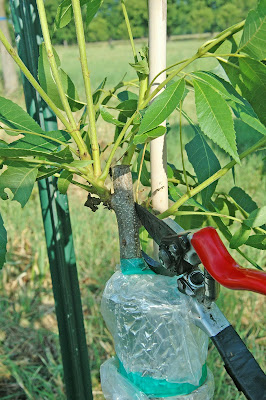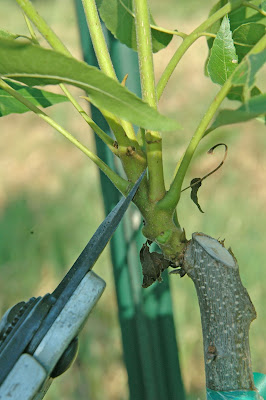I've been working my way through my orchard trimming grafts, when I came to a bark graft with a profusion of new shoots (photo at right). At first I thought it would take just a couple of snips with the pruning shears to train the scion to a single stem but upon closer inspection pruning this tree turned out to be a little more complex.
A close-up photo (at left) reveals that 3 buds broke and began growth from the scion. These are labeled 1,2 and 3. The bud labeled #2 produced a shoot that quickly formed stalked buds. These stalked bud have since sprouted and formed the shoots labeled A, B, and C. My job was to choose the best shoot to become the central leader and remove all others.
I started by removing the primary and secondary shoots at bud #1 (photo at right). I cut off both shoots with a single cut.
Next, I removed the top of the scion just above bud #2 which also removed the shoot growing from bud #3. Note that I made this cut at an angle to facilitate rapid healing of the pruning wound (photo at left).
At this point, I'm down to a single shoot from the original scion (photo at right) but unfortunately this shoot has already grown 3 shoots from stalked buds. Looks like I need to keep pruning.
I chose to keep the shoot on the right in the photo. This was the strongest of the three shoots and enabled me to make one pruning cut to remove the other shoots (photo at left). Again, I made an angled cut.
After all my pruning, I was left with a skinny single shoot (photo at right). However, with all other competing shoots removed, the tree will quickly focus all its energy into growing and strengthening this shoot into a central leader.
To prevent wind damage to the remaining spindly shoot I made sure to tie it to my training stink in two places using green flagging tape (photo at left). I also cut off the grafting tape used to seal the plastic bag around the scion. Judging from the size of the stock tree, I'm expecting this scion to grow 5-7 feet in height and over one inch in diameter by summer's end.







